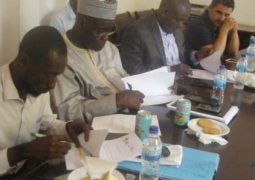The Support Progamme to Integrate National Action Plans for Avian and Human Influenza (SPINAP-AHI) running from May 2007 to December 2010 has come to an end.
The SPINAP-AHI was a 44-month programme executed by the Africa Union Interafrican Bureau of Animal Resources AU-IBAR.
Speaking at a recent forum on the closure of the project at NaNA conference hall, Dr Kebba Daffeh, national coordinator of the project in The Gambia, who doubles as the deputy director of animal health and production services at Abuko, under the Department of Agriculture, said SPINAP was funded by the European Union and the African Union Commission.
The SPINAP project aims to contribute to the reduction of the socio-economic impact of human influenza and the potential loss of human lives by preventing and controlling avian influenza in animals, as well as preparing for a possible human influenza pandemic.
According to Mr Daffeh, the project was realised by the provision of technical and financial supports to enable the participating countries prevent HPAI outbreaks and ensure speedy containment where infections occur.
He added that SPINAP - AHI was developed in response to the escalating global threat of avian influenza, especially its introduction into
He said with other technical organisations and key global highly pathogenic avian influenza actors,African countries, including The Gambia, developed integrated national action plans against HPAI and mobilized resources for its prevention and control efforts.
“SPINAP-AHI is one of the major pan-African efforts to combat HPAI by supporting these plans,” he said.
He noted that The Gambia government had been working very closely with AU-IBAR through SPINAP-AHI.
He also recognised the important role of AU-IBAR in the development of the animal resources sector in the African continent, adding that AU IBAR had been instrumental in the eradication of rinderpest control programme (PARC) and the pan-African Programme for the Control of Epizootic PACE.
He said the last case of rinderpest was reported in The Gambia in 1965 and CBPP in 1971. He also used the opportunity to profoundly thank AU-IBAR for the success that had been registered in the eradication of rinderpest in
The
He added that The Gambia’s VACNADA project would focus on countrywide mass vaccination campaign against pests des petites ruminants (PPR), which is today the major infectious disease in small ruminants and is responsible for most of the morbidity and mortality in sheep and goats throughout the country.




